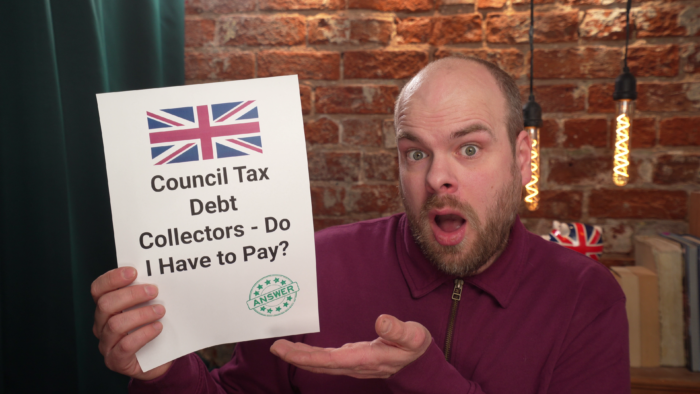Council Tax Debt Collectors – Do I Have to Pay?
For free & impartial money advice you can visit MoneyHelper. We work with The Debt Advice Service who provide information about your options. This isn’t a full fact-find, some debt solutions may not be suitable in all circumstances, ongoing fees might apply & your credit rating may be affected.

For free & impartial money advice you can visit MoneyHelper. We work with The Debt Advice Service who provide information about your options. This isn’t a full fact-find, some debt solutions may not be suitable in all circumstances, ongoing fees might apply & your credit rating may be affected.
Who Has To Pay Council Tax?
In general, your council tax bill is calculated based on at least two adults residing in the premises. Married couples or partners are jointly responsible to pay the council tax. Some people are not counted towards the headcount for council tax, as shown below.
- Children under the age of 18.
- A person on an applicable apprenticeship.
- Young people (18 to 19) who are in full-time education.
- Somebody attending college or university full-time.
- Anyone under the age of 25 who is getting Education and Skills Funding Agency funding.
- Anyone studying to be a nurse.
- People with severe mental illness.
- A carer who lives in.
- A registered diplomat.
The amount of council tax you have to pay, depends on the council tax band that is derived from the value of your home. The table below shows what these bands are.
| Property Value | Council Tax Band |
| Up to £40,000 | A |
| Over £40,000 and up to £52,000 | B |
| Over £52,000 and up to £68,000 | C |
| Over £68,000 and up to £88,000 | D |
| Over £88,000 and up to £120,000 | E |
| Over £120,000 and up to £160,000 | F |
| Over £160,000 and up to £320,000 | G |
| Over £320,000 | H |
If you think that there has been an error, you might be able to challenge your tax band.
You can challenge your council tax band online but you will need to have supporting evidence that proves there has been a mistake.
How a debt solution could help
Some debt solutions can:
- Stop nasty calls from creditors
- Freeze interest and charges
- Reduce your monthly payments
A few debt solutions can even result in writing off some of your debt.
Here’s an example:
Situation
| Monthly income | £2,504 |
| Monthly expenses | £2,345 |
| Total debt | £32,049 |
Monthly debt repayments
| Before | £587 |
| After | £158 |
£429 reduction in monthly payments
If you want to learn what debt solutions are available to you, click the button below to get started.
Do I have to pay council tax debt collectors?
» TAKE ACTION NOW: Fill out the short debt form
What powers do bailiffs possess when it comes to collecting council tax debt?
Other ways that a council may recover council tax debt
What can you do instead of paying a debt collector or bailiff?
Thousands have already tackled their debt
Every day our partners, The Debt Advice Service, help people find out whether they can lower their repayments and finally tackle or write off some of their debt.

Natasha
I’d recommend this firm to anyone struggling with debt – my mind has been put to rest, all is getting sorted.
Reviews shown are for The Debt Advice Service.
How do I appeal my council tax bill?
If you think that your council tax bill is wrong, you need to write to your council and tell them why you think that your bill is incorrect. You can find out who your local council is here.
Your council will then reply to you within 2 months.
This reply will either:
- Tell you you are correct, your bill is wrong, and a new bill will be sent.
- Tell you that the bill is right and explain why.
If the council replies and says that your bill is wrong, you must carry on paying the amount on your old bill until a new one comes.
If you wish to appeal your council’s decision, or you don’t get a reply within 2 months, you can appeal to the Valuation Tribunal. This is a free services but you need to pay for your own costs.
For your appeal to be valid, you need to:
- 2 months of the council telling you their decision
- 4 months after you first wrote to the council about your council tax bill.
If the Valuation Tribunal agrees with you and says that the council was wrong, your new bill will be sent along with your monthly adjustments.
What is the Council Tax Reduction Scheme?
The Council Tax Reduction Scheme or the Council Tax Support Scheme is one way of lowering your council tax bill if you can’t afford to pay it.
Keep in mind that not everyone is eligible, but you can reduce your bill by up to 100%. You don’t need to be a renter or homeowner to apply, and you also don’t need to have a particular employment status.
The reduction that you get depends on:
- Your local council – each council has their own process and scheme
- Your personal circumstances – how many dependents you have, your benefit entitlement, etc
- Your total household income
- If your children live with you
- If other adults live with you.


